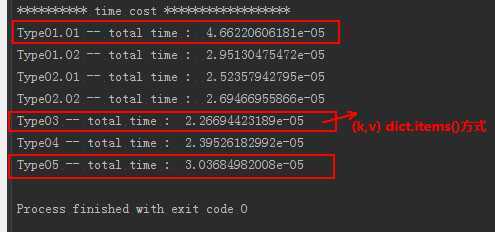标签:
今天专门把python的字典各种方法对比测试了一下性能效果.
测试代码如下:
1 def dict_traverse(): 2 from time import clock 3 my_dict = {‘name‘: ‘Jim‘, ‘age‘: ‘20‘, ‘height‘: ‘180cm‘, ‘weight‘: ‘60kg‘} 4 5 t_start = clock() 6 for key in my_dict: # 性能最差写法.无优化 7 print ‘Type01.01: %s --- %s‘ % (key, my_dict[key]) 8 t1 = clock() 9 10 for key in my_dict: # 性能较上优,可见get()方法作了优化. 11 print ‘Type01.02: %s --- %s‘ % (key, my_dict.get(key)) 12 t2 = clock() 13 14 for key in my_dict.keys(): # keys()方法也是作了优化. 15 print ‘Type02.01: %s --- %s‘ % (key, my_dict[key]) 16 t3 = clock() 17 18 for key in my_dict.keys(): # 19 print ‘Type02.02: %s --- %s‘ % (key, my_dict.get(key)) 20 t4 = clock() 21 22 for key, value in my_dict.items(): # 标准写法,性能最佳写法 23 print ‘Type03: %s --- %s‘ % (key, value) 24 t5 = clock() 25 26 for key, value in my_dict.iteritems(): # 性能较上,有少量损失. 27 print ‘Type04: %s --- %s‘ % (key, value) 28 t6 = clock() 29 30 for key, value in zip(my_dict.iterkeys(),my_dict.itervalues()): # 性能较差. 31 print ‘Type05: %s --- %s‘ % (key, value) 32 t7 = clock() 33 34 print ‘********** time cost ******************‘ 35 print ‘Type01.01 -- total time : ‘, t1-t_start 36 print ‘Type01.02 -- total time : ‘, t2-t1 37 print ‘Type02.01 -- total time : ‘, t3-t2 38 print ‘Type02.02 -- total time : ‘, t4-t3 39 print ‘Type03 -- total time : ‘, t5-t4 40 print ‘Type04 -- total time : ‘, t6-t5 41 print ‘Type05 -- total time : ‘, t7-t6 42 43 44 45 if __name__ == ‘__main__‘: 46 dict_traverse()
经过多次运行,可发现不同写法,耗时是有差异.
对比结果如下图所示.

综上对比可发现:
对于字典遍历,推荐如下写法,性能最优.
1 for k, v in my_dict.items(): 2 print k, v
Python学习笔记_字典(Dict)_遍历_不同方法_性能测试对比
标签:
原文地址:http://www.cnblogs.com/selfrebuild/p/4206367.html